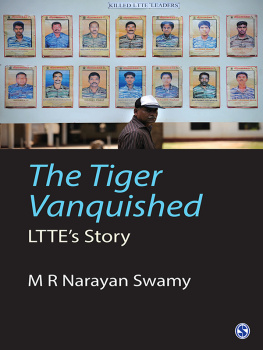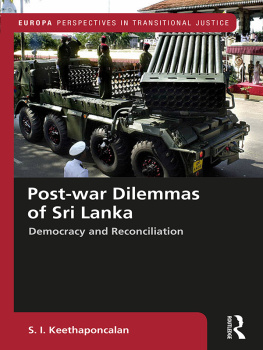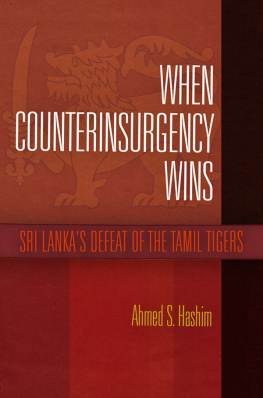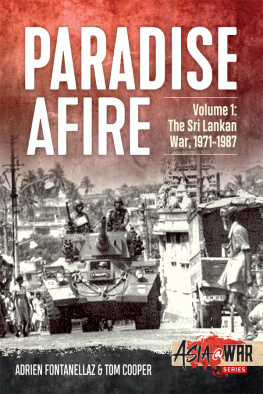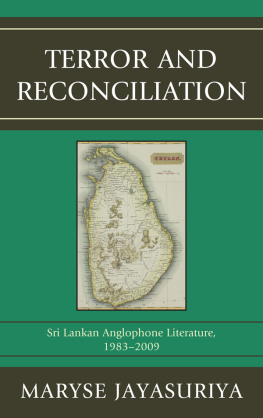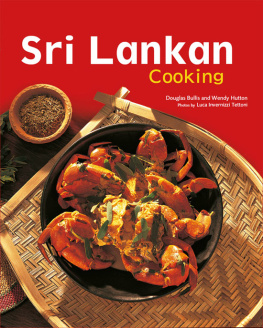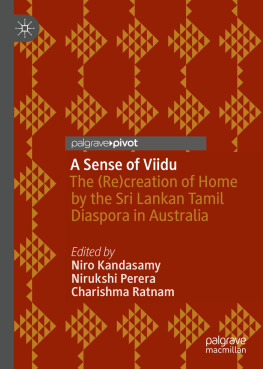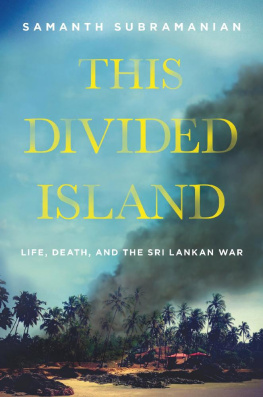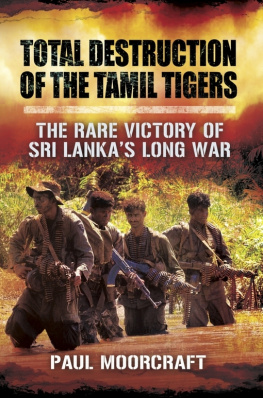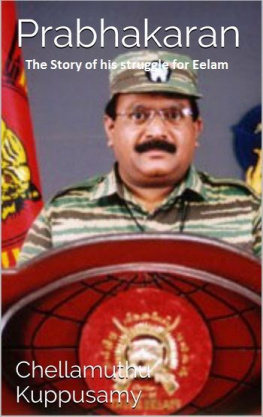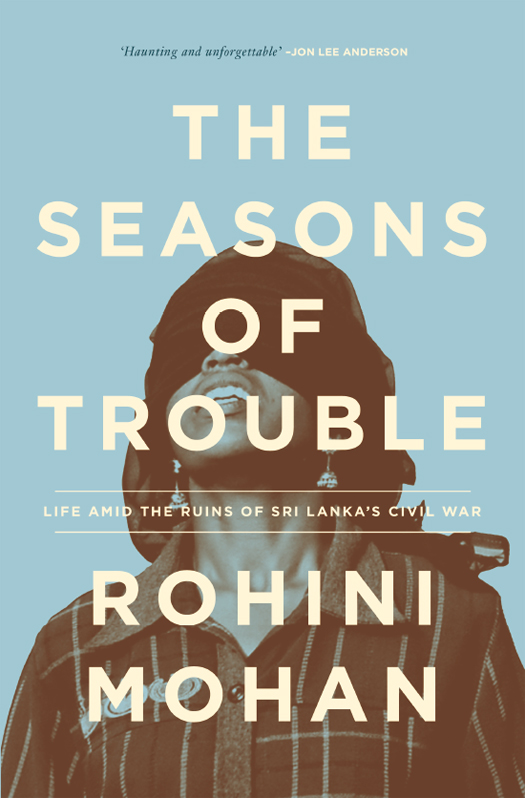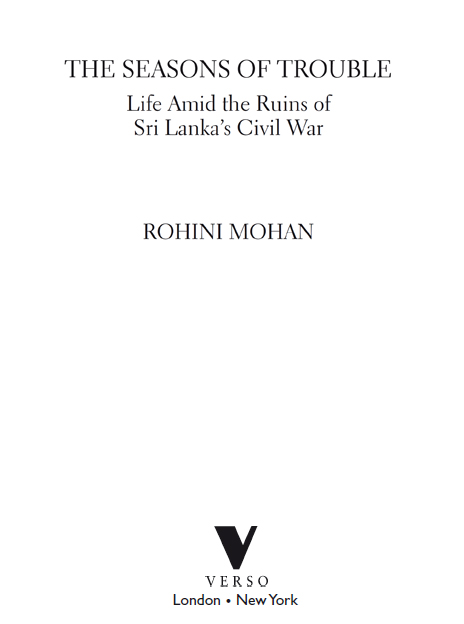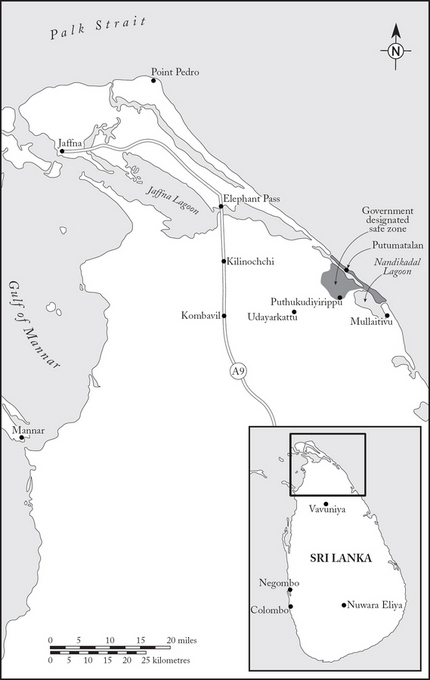First published by Verso 2014
Rohini Mohan 2014
All rights reserved
The moral rights of the author have been asserted
Verso
UK: 6 Meard Street, London W1F 0EG
US: 20 Jay Street, Suite 1010, Brooklyn, NY 11201
www.versobooks.com
Verso is the imprint of New Left Books
ISBN-13: 978-1-78168-600-3
eISBN-13: 978-1-78168-678-2 (UK)
eISBN-13: 978-1-78168-601-0 (US)
British Library Cataloguing in Publication Data
A catalogue record for this book is available from the British Library
Library of Congress Cataloging-in-Publication Data
A catalog record for this book is available from the Library of Congress
v3.1
To Thatha, for birthing an obsession
And to Sanjaya, for nurturing another
Contents
Preface
IN LATE 2009, I met the first of the three people whose stories are told in this book. After a hurried five-minute interview under a soldiers watch in a dank refugee camp, the gaunt young Tamil woman challenged me. Im sure youll never return to see us, she said. In the next five years, I went back to her repeatedly. In these pages, she is Mugil. That same year, a middle-aged woman in a middle-class neighbourhood in Colombo told me of her bewildering search for a disappeared son. I call her Indra here. Her son, who finally reached England after several tumultuous years, is able to tell his story in his own name: Sarva.
Over five years, the three let me into their lives and innermost thoughts. During this time, I lived in Sri Lanka for a total of ten months, and in England for another three. The rest of the time, I kept in touch with them through weekly phone calls from India. It was a journey that took us from mutual mistrust to confidence, as we negotiated the pitfalls of memory, bias, history and trauma. We talked in Tamil, without an interpreter, which somewhat helped overcome our differences of country, gender and class. The reportorial rigour of scrutinising documents, photographs and maps, listening to silences, repeating questions and revisiting locations provides the foundation for the events described in this book.
I conducted dozens of other interviews at length, some with people who had met more tragic fates or lucky ends than Indra, Sarva and Mugil. But the words, decisions and silences of these three articulated better than most how the effects of a conflict can persist for a year, five or decades after. Their compelling stories also spoke to the Tamil communitys struggle with its past. They showed me the indelible nature of the violence and nationalism that reached deep into language and relationships, and crept into their futures. These stories challenged my notions of victimhood, patriotism and community.
My goal here is to tell their narrative as honestly and engagingly as they did, to show the changes they experienced among the wreckage of civil war and the mundane omnipresence of conflict. Being present through these peoples setbacks and challenges in the aftermath of this war, I was privy to incidents and emotions they subsequently and frequently blocked out, reframed or remembered differentlyin order to cope, because of oppressive fears, or simply to satisfy the human need for closure. As they attempted to define their lives on their own terms, they went from narrating their experiences as a series of events, to a series of responses, to a spiral of melancholy and aspiration.
Apart from the inaccuracy or absence of official data, crackdowns on media, and restrictions on mobility, this is what makes war so hard to report on, and for those in Sri Lanka to live through and move on from: loose ends rarely tie up. Incompleteness and dread are as tangible as the deaths and destruction.
The protracted civil war changed the nature of being Sinhalese, Tamil or Muslim in Sri Lanka, and political sides have often tried to solidify these identities into exclusive, warring blocs. None of the people in this book are entirely representative of Sri Lanka or the communities they belong to, but they inherit the same conflict and its after-effects. Their points of view, prejudices and contradictions push and pull at the ethnic stereotypes the conflict has created.
As the world grapples with new democracies and old hate, these three lives are a grim caution. Mugil says her experience is a warning for the next marginalised group that refuses to assimilate. Sarva sees the war as a permanent obstacle to love and happiness. Indra, his mother, calls it destiny.
July 2014
Acknowledgements
DURING MY RESEARCH and writing, a number of people advised, scolded, cheered, sheltered, fed, and read me. My earliest and steadiest guides in Sri Lanka were Ruki Fernando and Ahilan Kadirgamar. V. V. Ganeshananthan fine-tuned my ideas and words from the very beginning to the last draft. Their generosity and honesty kept me from giving up when roads closed or concepts knotted up.
After every field trip, seeking an even perspective, I turned by habit to Sithie Tiruchelvam. For long conversations about then and now, Im grateful to Jayadeva Uyangoda, Seelan Kadirgamar, Muttukrishna Sarvananthan, Nirmala Rajasingham, Valentine Daniel and Radhika Coomaraswamy.
Colombo became home thanks to the warmth of Zainab Ibrahim, Aminna (Turin Abeysekera) and the kitchen magic of Rasamma. At another time, Tahseen Alam gave me shelter. In Trincomalee, my hosts Mr and Mrs Laxmanan never flinched when I dropped in without notice. In Jaffna and the Vanni, P., S., A., and T. shared their humble single rooms with me. In Mannar, Father Jeyabalan Croos always had enough room for a tired traveller. They offered not only survival tips but also glimpses of daily life in Sri Lanka.
I am thankful to Mirak Raheem, Bhavani Fonseka and the Centre for Policy Alternatives, Colombo, for their stellar record of changes in the north and east; to everyone at the INFORM human rights documentation centre; to Sanjana Hattotuwa for the journalistic force that is Groundviews; to Ponnudurai Thambirajah for the silence and well-stocked brilliance of his library at the International Centre for Ethnic Studies; and to Deanne Uyangoda, Dinidu de Alwis, Ananda Galapatti, Sumathy Sivamohan, Guruparan Kumaravadivel, Meera Srinivsan, Namini Wijedasa, Murali Reddy, Father Ravi, N. Singham, Elangovan Chandrahasan, Vel Thanjan, Sanjeev Laxmanan, Sinha Ratnatunga, Manik de Silva, Nishan de Mel, Shireen Saroor and V. K. Shashikumar for their ideas.
Its unfortunate that many Sri Lankans crucial to my research cannot be named, so that they can live without another reason to fear for their life or freedom. I also couldnt have done without the friends in Colombo who helped by just being there, talking of everything but work, inviting me to cricket matches, karaoke nights and family dinners.
I am indebted to my writing partner, Mathangi Subramanian, for her reactions to my early drafts. Also to Dave Swann in Chichester, whose trick for finishing a first draft Ill never forget; Dragan Todorovic, Alex Padamsee, Nandini Nair and Anuj Bhuwania for their encouragement and sharp feedback; Nicholas Lemann, for his precise advice as editor in my first attempt at writing about Sri Lanka at Columbia University, New York; Jonathan Shainin and Vinod K. Jose from the


